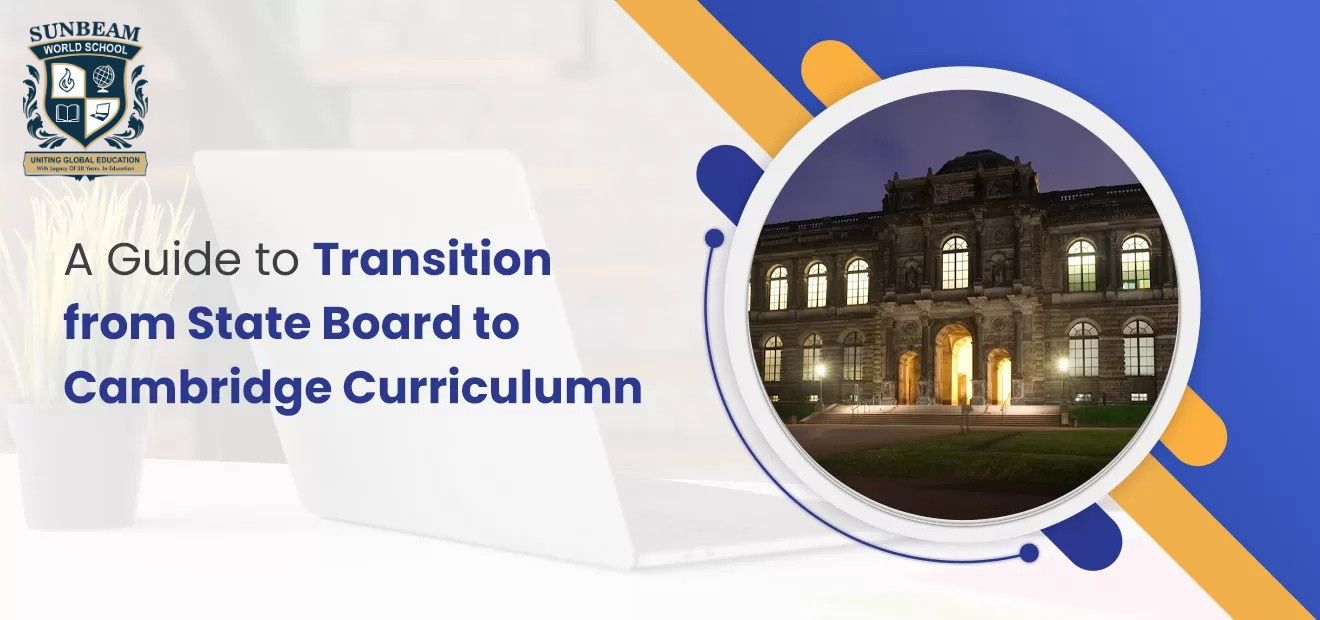
 Accredited Online School
Accredited Online School
A Guide to Transition from State Board to Cambridge Curriculum
Every child’s educational journey is unique, shaped by the curriculum, learning environment, and teaching methods they experience. With the growing emphasis on personalised learning and equity in education, many parents and educators are exploring alternatives to traditional state board curricula. One such alternative that is gaining traction is the Cambridge curriculum.
Parents considering this change for their children must understand the Cambridge curriculum, how it differs from state board systems, and how to make the transition seamless. At Sunbeam World School India, we specialise in guiding families through this transformative journey with our robust online learning platform.
What is the Cambridge Curriculum?
The Cambridge curriculum, developed by Cambridge Assessment International Education (CAIE), is a globally recognised educational framework designed to prepare kids for academic excellence and life beyond the classroom. It emphasises:
- Critical Thinking: Cambridge encourages students to analyse, evaluate, and apply knowledge rather than rote memorisation. It encourages learners to delve deeper into concepts, fostering intellectual curiosity and problem-solving skills essential for real-world scenarios. This approach prepares students for higher education and professional environments by prioritising understanding over memorisation.
- Global Perspective: Cambridge offers a curriculum incorporating international standards while allowing schools to adapt to local contexts. Cambridge ensures students gain a broader worldview by integrating multicultural elements into the syllabus, promoting appreciation and understanding of global issues while respecting local traditions.
- Personalised Learning: Promotes tailored education & learning experiences to cater to diverse learners, ensuring each student achieves their potential. The Cambridge framework emphasises adapting teaching strategies to meet individual learning styles, empowering students to excel in their unique capacities.
- Flexibility: Provides choices in subjects, allowing students to focus on areas of interest and strength. This enables students to explore diverse disciplines, helping them identify and pursue their passions while maintaining a balanced academic profile.
The Cambridge curriculum’s focus on education equality and equity ensures that students from various backgrounds can access high-quality education tailored to their needs.
Key Differences Between State Board and Cambridge Curriculums
Transitioning from a state board to the Cambridge curriculum is a significant shift. Understanding the differences can help families make informed decisions.
1. Pedagogical Approach
- State Board: Emphasizes completion of syllabus and standardised testing, often focusing on memorisation.
- Cambridge: Centers on skill development, critical thinking, and application-based learning.
2. Assessment Style
- State Board: Annual examinations evaluate students’ ability to recall and reproduce content.
- Cambridge: Employs formative assessments, including projects, presentations, and real-world problem-solving tasks.
3. Global Relevance
- State Board: Primarily aligned with local education policies and standards.
- Cambridge: Offers an internationally recognised curriculum that facilitates global mobility for higher education and careers.
4. Focus on Equity
- State Board: Often struggles to balance equity and education equality, particularly in resource-limited settings.
- Cambridge: Actively integrates inclusive practices to accommodate diverse learners and promote school equity.
Benefits of the Cambridge Curriculum
Choosing the Cambridge curriculum opens doors to numerous benefits for students, preparing them for academic success and personal growth. Some notable advantages include:
1. Global Recognition
The Cambridge curriculum is accepted by universities and employers worldwide, making it an ideal choice for families aspiring to provide children with international opportunities.
2. Skill Development
Students develop critical thinking, communication, research, and collaborative skills, equipping them for challenges in the 21st-century world.
3. Personalized Learning
The curriculum caters to each student’s unique needs through flexible subject selection and tailored teaching methods, ensuring no child is left behind.
4. Equity in Education
Cambridge’s focus on providing equal opportunities for diverse learners promotes a sense of inclusion and fairness, addressing the disparities often seen in other educational systems.
5. Cultural Sensitivity
While globally aligned, the Cambridge curriculum allows schools to incorporate local cultural and educational contexts, ensuring relevance to the student’s environment.
Steps to Transition from State Board to Cambridge Curriculum
Transitioning to a new curriculum is a significant decision that requires careful planning. Here are the steps to ensure a smooth shift:
1. Research and Understand the Curriculum
Familiarise yourself with the Cambridge framework, teaching methodologies, and assessment patterns. Resources like Sunbeam World School India provide in-depth guidance and support.
2. Evaluate Your Child’s Needs
Assess your child’s strengths, learning style, and career aspirations to determine how the Cambridge curriculum aligns with their goals.
3. Select the Right School
Choose a school or platform like Sunbeam World School, which is experienced in delivering the Cambridge curriculum through innovative online models.
4. Prepare for the Transition
Engage your child in bridging programs that help them adapt to the Cambridge way of learning, emphasising project-based work and critical thinking.
5. Foster Continuous Communication
Maintain open communication with educators to address challenges and monitor your child’s progress.
Challenges in Transitioning to the Cambridge Curriculum
While the benefits are numerous, transitioning to the Cambridge curriculum can present challenges, including:
1. Adjustment Period
Students may take time to adapt to a new teaching method, focusing on application and analysis.
2. Initial Learning Curve
The Cambridge curriculum focuses on critical thinking, and research might be unfamiliar, requiring extra effort initially.
3. Resource Availability
Access to quality learning materials and trained educators is crucial. Schools like Sunbeam World School India address this challenge by providing comprehensive online resources and expert guidance.
4. Cost Implications
The Cambridge curriculum might have higher associated costs compared to state boards. However, the long-term benefits of global opportunities often outweigh these initial investments.
5. Parental Involvement
Parents must stay actively involved, especially during transition, to support their child’s learning and promptly address concerns.
Empower Your Child’s Future with Sunbeam World School India
Transitioning from a state board to the Cambridge curriculum can be a transformative experience, paving the way for holistic development and global opportunities. While challenges exist, the advantages outweigh them when supported by the right educational institution.
At Sunbeam World School India, we specialise in providing a seamless transition to the Cambridge curriculum through our innovative online platform. By prioritising equity in schools, education equality and equity, and personalised learning, we ensure that every child receives the attention and resources they need to thrive.
Ready to make the change? Let Sunbeam World School India guide you through this rewarding journey. Contact us today to explore how we can support your child’s educational aspirations and help them reach their full potential.
In this article
Press and Blogs
Stay updated with our press releases, educational blogs, and more.







